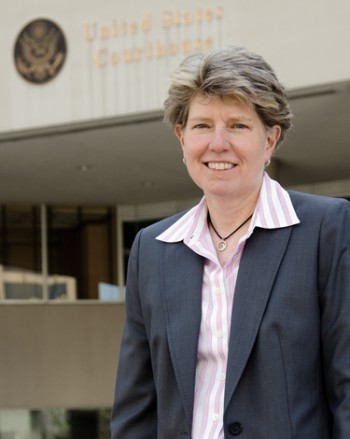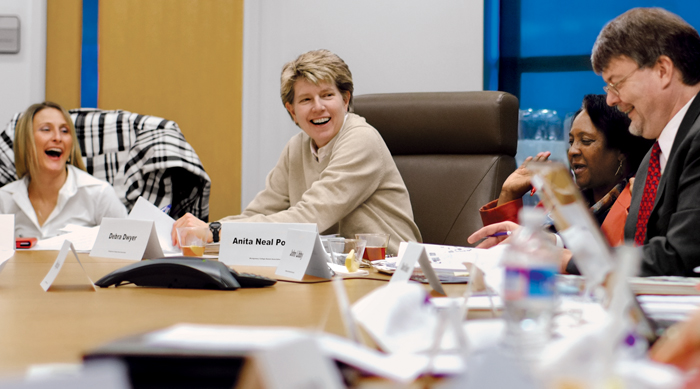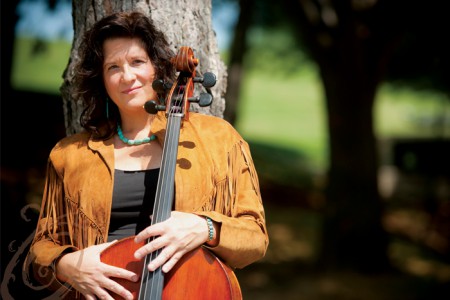When Does the Prosecution Rest?

Photo: Bill Tata
Dwyer, a member of the Alumni Association’s Board of Governors, says, “I have strong feelings about Montgomery College and what it did for me. I could never have enjoyed a fabulous career if it weren’t for the College.”
Her illustrious 30-year career includes a two-year stint as an FBI agent as well as a prosecutor in both the US Attorney’s Office and the Office of the State’s Attorney in Montgomery County. She’s investigated and tried hundreds of cases, not the least of which was that of Hadden Clark, whose gruesome murder of six-year-old Michele Dorr in 1986 vexed Montgomery County investigators for more than a decade.
“There are a few cases I consider ‘hall of fame’ cases—the best prosecutions—in my career in the office,” says Montgomery County State’s Attorney John McCarthy, who has taught paralegal studies courses at Montgomery College since 1979. “The Hadden Clark case is one of them. Along with co-prosecutor Jim Trusty, Debbie was involved in the case from the initial investigation through the post-trial process. It was an extraordinary piece of work.”
When she left the State’s Attorney’s Office in 2002, Dwyer accepted an appointment at the US Attorney’s Office in Baltimore, where she continued her meticulous work as a prosector. In 2010, she earned a prestigious award from the US Department of Justice for superior performance. She successfully prosecuted a violent Baltimore drug-dealing organization known as “Special Heroin.” The challenging case resulted in convictions of three defendants, who shot and murdered several witnesses and potential cooperators.
Dwyer knew from an early age she wanted to be in law enforcement: “I remember my mom taking me over to the old courthouse in Rockville. I remember wanting to be an FBI agent or a prosecutor—I just didn’t know how to get there.”
After graduating from Richard Montgomery High School in Rockville, Dwyer admits that the University of Maryland intimidated her, and she decided to join many of her friends who were headed to Montgomery College.
“I went to a pretty diverse high school, but to go to MC and see people from nations that I didn’t even know existed, to see people my parents’ age going to school, and to see people going to school at night, that was really cool,” she said. “I just fit in. I loved every minute of it.”
When Dwyer finished two years at Montgomery College, she relied on the advice of Dr. Robert Dompka, her criminal justice professor, who recommended American University’s criminal justice program. At American University, she received both a bachelor’s and a master’s degree, as well as a juris doctor.
Dwyer wants to share her expertise with students who are just starting out. She’ll get that chance through a new mentoring initiative created by the Alumni Association. “I’m thrilled we’re mentoring students,” says Dwyer. “I do a lot of it with the bar [association]. I didn’t have a mentor, but I turned people into mentors.” Dwyer says it’s critical for young people to seek out people who can help them navigate the system, particularly in fields like law enforcement, which can be perceived as a man’s world.
After graduating from law school in 1986, Dwyer went into the FBI. She spent two years as the only female investigator in the region comprising Pensacola, Orlando, and Jacksonville, Florida.
Homesick and eager to tackle more “hands-on stuff,” Dwyer came home one weekend in May 1988. She interviewed with Andrew Sonner, then state’s attorney. He offered her a job, and she moved back to Montgomery County.
“When you leave the county and you go other places in the country that are not as diverse, you notice it right away. This county is so diverse—and so accepting of diversity,” says Dwyer.
Dwyer is a champion for diversity. It’s personal. Her comfort and confidence enabled Dwyer to lend her story to “Portraits of Life: LGBT Stories of Being,” featuring lesbian, gay, bisexual, and transgender individuals who contribute to the success of Montgomery County. “When Dr. Pollard asked me to participate, I was honored to do this project,” she says, “partly because I was representing this group of people, but more so because I was doing it for Montgomery College.”
Last year, she earned a position on the Montgomery College Alumni Association’s Board of Governors. “I head the bylaws committee,” she says. “That’s what happens when you have ‘JD’ by your name.”
She believes a bigger part of her role on the alumni board is that of an ambassador. “I’m always bringing people to fundraisers. I love the Dogfish Head fundraiser. I’m constantly talking to people about the virtues of Montgomery College,” she says.

Debbie Dwyer, center, who braves an hour-long commute to get to bimonthly Alumni Association meetings, believes it’s worth the effort. She says the alumni board offers her the chance to work with an eclectic group who mentor students, plan fundraising activities, and coordinate alumni events. Photo by Sanjay Suchak.
Alumni Association President Carol Leahy ’74 underscores the idea that the board is doing some groundbreaking work. And she expresses how important it is to have professionals like Dwyer on the board. “Debbie not only brings experience and knowledge to the board, but also she’s enthusiastic and more than willing to participate,” says Leahy. “We need people like Debbie to keep the Alumni Association moving forward.”
Moving forward is Dwyer’s philosophy. She is pursuing a judgeship in Montgomery County. “I really have aspirations for the bench. I never imagined I’d be pursuing this position, but I’ve reached a point where I’ve accomplished pretty much everything I wanted to. As an assistant US attorney, I’ve practiced law at the highest possible level.”
Among Dwyer’s most ardent supporters is John McCarthy, who says, “Debbie would make a strong candidate for a judge in Montgomery County. She possesses not only an extensive body of trial work, but also the people skills to manage the hundreds of people who go through this judicial system.”
“If appointed to the bench, it would be a tremendous honor and it would carry a lot of responsibility,” says Dwyer. Her presence on the bench would reflect the diversity of Montgomery County—and the state of Maryland.
“I’d like to come back to Montgomery County, where I’ve lived my whole life, to start a new phase,” she says.
—Jill Fitzgerald
This article first appeared in the fall 2013 issue of Insights.








Follow Us